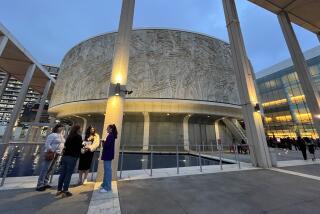Arts center in Gold Rush town opens, but coronavirus forces closure two days later. What now?
In tiny, ravaged Grass Valley, best known as the site of the historic Empire gold mine, the last two years were marked by wildfires that left the town scarred, and dotted by blackouts that closed businesses for 22 days.
Locals worried for the future. But the Gold Rush community had started to feel hopeful while preparing for the planned March 12 soft opening of the town’s $6.3-million Center for the Arts, housed in an Art Deco complex complete with a modern art gallery, theater, commercial kitchen and a 492-seat auditorium.
Culture boosters had booked Arlo Guthrie and Amy Grant as part of the first season, and were working to uplift residents in the devastated area outside Sacramento, after so many setbacks.
For opening night, the center’s bar was stocked with craft beer and Cabernet. Inside, in an illuminated gallery, sculptor Nancy Mintz greeted guests, who munched on polenta bites, highlighting her illuminated clay and metal works. The next night, townspeople gathered to hear blues and rock guitarist Tinsley Ellis.
They couldn’t know that by the following day a global pandemic sparked by the coronavirus would suddenly force the region’s new cultural jewel to shut its doors — triggering layoffs for its eight-member production staff and leaving it struggling to survive. The center closed March 14 and officials have no idea when it may reopen.
“We have waited so long and so patiently to open. There was one delay after another, but then everything was finally sparkling and welcoming and wonderful. Our rural community was ready for some good news, and all along, they supported our mission deeply,” said Amber Jo Manuel, the center’s executive director.
Now, she hopes that the community will rally around the center again as it tries to raise the $150,000 it needs to cover operating expenses. On top of that, officials still somehow must come up with the remaining $3.2 million of the $6.3 million renovation project cost.
“We have to keep the faith because everyone, I mean everyone, needs the arts,” Manuel said. “It’s our sustenance.”
Grass Valley, with a population of about 13,000, is located in Nevada County, home to almost 100,000. Its Gold Rush days left a lasting legacy, allowing Grass Valley and neighboring Nevada City to form diversified economies focusing on tourism and the services sector. Many locals commute to the Sacramento Valley or work in agriculture, retail, trade, engineering and construction. Before the center’s renovation, the nearest arts venue was a 60-mile drive to the state capital.
The building that houses the center used to be a cinderblock car dealership from 1947 to 1984, according to Manuel, who was born and raised in the town. It later became a beauty school and a gymnastics and dance center, among other rebirths, then evolved into a venue with 300 seats claimed from an old movie theater. Workers staged 150 events annually, drawing art aficionados and more than 47,000 concertgoers.
After an 18-month renovation it briefly reopened, billing itself as an oasis of culture in the Sierra Nevada foothills.
“I remember sitting there and listening to Tinsley Ellis and the blues and thinking, ‘No matter who’s playing. I’m coming to every performance,’” recalled Grass Valley Mayor Lisa Swarthout. “There was such a spirit and a sense of gratitude. Small-town crowds are so thrilled for these special acts.”
She went to high school locally, then left for college and work in the Bay Area until her return to the town, and had been “counting down the days” to the opening.
“I’ve been so excited that this building would transform our downtown business district,” Swarthout said. “People visit us to learn more about the Empire Mine, one of the oldest and richest gold mines in the state, and I thought that they could also catch a show, soak up the friendliness of Grass Valley. But who knew we would be interrupted by a pandemic?”
Mintz, the artist, from Nevada County, said she spent months planning for her exhibition. She said that “the aura of that first night was just symbolic — marking a new beginning — for the building, for the town. We need to do what we can to share art and artistic vision.”
Manuel said supporters are scrambling to help, launching an emergency fund and boosted by a Small Business Administration loan, before tackling the “huge outreach” that’s needed to raise funds to cover the remaining construction costs.
“It’s no surprise that during the COVID-19 lockdown people are turning to the arts for reflection and inspiration. This is a gift that we give others and ourselves,” Manuel said, “and after the shelter-in-place orders are gone, all of us will need art and music and gatherings for stimulation more than ever.”
Nationwide, studies show, the arts and cultural sectors may suffer a loss of as much as $3.6 billion due to the pandemic. The burden could land especially hard on small arts venues in remote areas, as individual and government aid tends to target larger cities and institutions, Manuel said.
“We are resilient. We will be back. But we need serious public support to get there.”
Manuel said she is trying to reschedule all shows originally slated for spring and summer. Some artists who have performed at the center in past years have expressed their eagerness to join a future lineup. Others wonder if it would be a good financial move since ticket sales may be limited due to social distancing -- or whether it makes sense, safety-wise.
Marc Cohn, the folk-rock singer, songwriter and musician based in New York, cited the moral obligation not to risk the health of fans, center staff and his own band. “I love the area. It’s amazing and the audience is appreciative and amazing,” he added. “But this is a different world that artists have to contend with.”
Still, he has fond memories of being onstage and looking out at attentive fans who “are really feeling the vibe of what we’re delivering. The connection between performers and people in a small community is quite special.”
Swarthout, awaiting the postponed reopening, can relate.
“No matter where you live, you need a gathering place that nurtures you and inspires you,” she said. “I can’t wait for it to reopen.”
More to Read
Sign up for Essential California
The most important California stories and recommendations in your inbox every morning.
You may occasionally receive promotional content from the Los Angeles Times.











